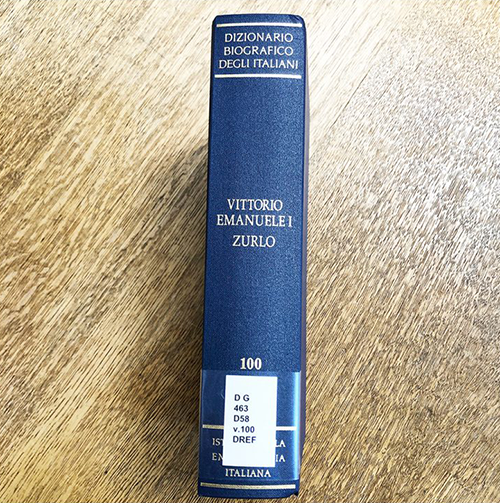
The publication of the hundredth (and final) volume of the Dizionario Biografico degli Italiani (Dbi, Biographical Dictionary of the Italians) last year by Istituto della Enciclopedia Italiana (Istituto Treccani) is a momentous occasion that may have been overshadowed by the global pandemic when libraries were shuttered and cataloging backlogs amassed. In the spirit of other European projects such as the Dictionary of National Biography (UK), the Diccionario biografIíco español (Spain), and the Allgemeine Deutsche Biographie (Germany), this ambitious biographical dictionary was conceived in 1925 with national-patriotic criteria in mind during the first phase of the National Fascist Party’s consolidation of power in Italy. Because of setbacks during and following World War II, the first volume did not appear in print until 1961 yet nearly every year thereafter, at least one or two volumes were added to the evolving reference set.
The enterprise endeavored to include the most illustrious figures in the history of Italy from the fall of the Western Roman Empire to the present day. Responding to the needs of the digital age, these 40,000 scholarly entries with sources and bibliographies have been made freely available online (but not free of ads) and integrated with other reference works they publish. While new entries are added to the online portal which also comprises Enciclopedia dell’Italiano, Dizionario di Filosofia, Enciclopedia Machiavelliana, Enciclopedia del Cinema, etc., entries in the print tomes are subject to the era in which they were authored. One of the conditions for inclusion in the Dbi is that of being deceased. According to its current director Raffaele Romanelli, the work is doomed to bear witness only to the past if worthy cultural figures are overlooked. He explains, “I have here a ready list of Italians who passed away this year: Alberto Arbasino, Franca Valeri, Rossana Rossanda. Will they all be destined for exclusion?”
The neo-Hegelian idealist philosopher, educator, and fascist politician Giovanni Gentile, who was also director of the Enciclopedia Italiana, referred to the work as “the golden book of the Italian stock.” In recent years, the notion of relevance has expanded to the world of business, technology, even of media and fashion, and includes previously unthinkable icons such as gay activist playwright Mario Mieli, notorious pornstar Moana Pozzi, and soccer heroes Enzo Bearzot and Dino Viola. According to Romanelli, there really never was a predefined canon. “To give an idea of the criterion, I would have liked to have included Pinocchio and Don Abbondio, non-existent but fundamental,” he quipped. Naturalized citizens such as the Swiss botanist Daniel Bovet and the mezzo-soprano Cathy Berberian of Armenian-American descent are included but entries for women remain overall at an appalling four percent. There are entries for fiction writers Natalia Ginzburg and Elsa Morante but it could be a long time before we see one for famous living writers such as Elena Ferrante. In 2015, the influential feminist art critic Carla Lonzi was added to the online version. Fans of the late philosopher, writer, and linguist Umberto Eco who died in 2016 still awaits an entry in the Dbi.
UC Berkeley is one of three dozen libraries across the country with the complete print set of 100 volumes. Most research libraries canceled their standing orders somewhere along the way. But what does this mean now when updates are not possible in a standard reference work such as this? Does the whole work become a cultural relic forever frozen in the epoch in which it was created? The lack of a critical lens and blatant exclusion of worthy cultural, political, scientific, and historical figures is reason enough to keep updating the work, illuminating the overlooked both from Italy’s past and recent years. While promises of forthcoming appendices and the technological capability of Trecanni to insert new entries and revise old ones in the online edition, the fate of this national reference work and others like it remains unknown. Students continue to rely, as many of us do for quick look-ups, on Wikipedia as the golden age of cumbersome print reference works sunsets. The burning question we should be asking ourselves is not what we would do without Wikipedia but what would we do without these print reference treasures, or knowledge bases, that constitute its foundation?
Sources consulted
Dizionario Biografico degli Italiani. Istituto della Enciclopedia Italiana fondata da Giovanni Treccani, https://www.treccani.it/biografico. Accessed 31 March 2022.
“Dizionario biografico degli italiani – Immagini.” YouTube, 14 December 2010.
https://youtu.be/pul4bOZ7lAs. Accessed 31 March 2022.
Fiori, Simonetta. “L’ultimo degli italiani.” La Repubblica, 12 December 2020. https://ricerca.repubblica.it/repubblica/archivio/repubblica/2020/12/12/lultimo-degli-italianiRobinson23.html. Accessed 31 March 2022.
“Istituto della Enciclopedia Italiana.” Enciclopedia on line. Istituto della Enciclopedia Italiana fondata da Giovanni, https://www.treccani.it/enciclopedia/istituto-della-enciclopedia-italiana. Accessed 31 March 2022.
Neveu, Bruno. “Biographie et historiographie: Le Dizionario biografico degli italiani.” Journal des Savants, vol. 1, no. 1, 1971, pp. 32–67, https://doi.org/10.3406/jds.1971.1240. Accessed 31 March 2022.
Sofri, Adriano. “Un monumento di civiltà: il centesimo volume del Dizionario biografico italiano.” Il Foglio, 23 December 2020. https://www.ilfoglio.it/piccola-posta/2020/12/23/news/un-monumento-di-civilta-il-centesimo-volume-del-dizionario-biografico-italiano-1588368. Accessed 31 March 2022.

Originally published in the European Studies Section Newsletter of the Association of College and Research Libraries.